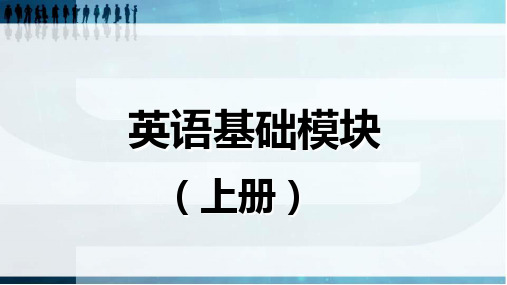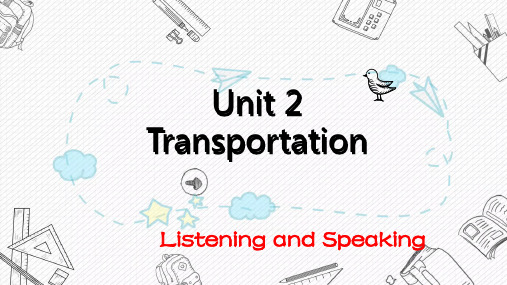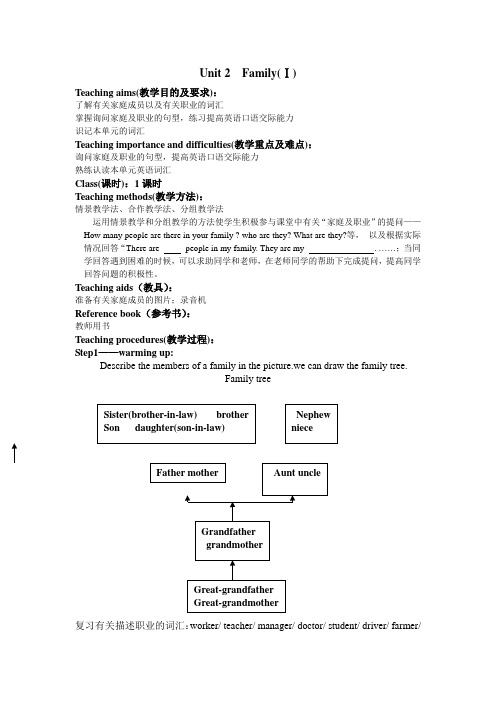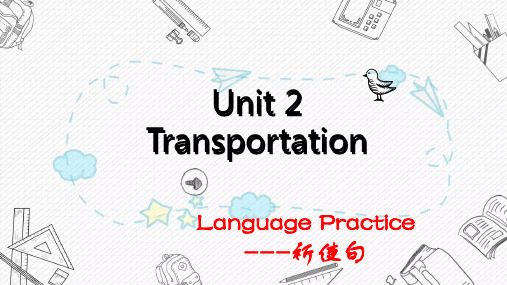中职英语基础模块上册Unit_2ppt
中职英语基础模块第二单元 ppt课件

1.You can see ____a__lo_t_o__f _____ students playing on thr play ground after class.
2.We play basketball on the playground _______a_f_t_e_r _c_la_s_s__ every day .
2020/12/2
1
Revising the key words of unit1.
2020/12/2
2
精品资料
• 你怎么称呼老师?
• 如果老师最后没有总结一节课的重点的难点,你 是否会认为老师的教学方法需要改进?
• 你所经历的课堂,是讲座式还是讨论式? • 教师的教鞭
• “不怕太阳晒,也不怕那风雨狂,只怕先生骂我 笨,没有学问无颜见爹娘 ……”
2) My mother is a teacher at a vocational school, and she is popular with her students.
我的妈妈是一所职业学校的老师。她深受学生们的欢迎。
3) My family is full of love and warmth.
He is dreaming to be a doctor.
2020/12/2
14
Put the following sentences into Chinese.
1) My parents and I enjoy living together with my grandparents.
我的父母和我很高兴和我的爷爷、奶奶住在一起。
我的家充满了爱和温暖。
2020/12/2
15
Match the words in Box A with the words in Box B.
最新中职英语基础模块上册Unit-2

MY FAMILY
• Who?
grandfather and grandmother
• What ? retired workers
• How old? over seventy
• How? kind \help
MY FAMILY
• Who?
father
• What ? manager
• How old? forty-five years old
• How? hard working
MY FAMILY
• Who?
mother
• What ? teacher
• How old? forty-five years ld
• How? Lively/interesting/popular
MY FAMILY
• Who?
uncle
• What ? student
• ⑶live with 与…一起生活
• Eg:I live with my family.我与我的家人一起生活
• ⑷ together with连同.......
• Eg: I’ll go shoping together with my friends. 我和我的朋友一起去买东西
• My father stands behind my grandfather. He is forty‒ • five years old. He is a manager at a company and he • is a hardworking man. Behind my grandmother is my
pular with her students.
• ⑸also adv. 也,同样 • Eg:He also asked to go. 他还去问
中职英语基础模块上册unit ppt课件

Kissing hands
吻手礼:吻手礼源于古代维京人用手向其日耳曼君 主递礼物的风俗,流行于欧美上层社会,是一种仅对贵 族已婚妇女实施的礼节。吻手礼一般在室内举行,并且 仅限于手腕以下部位,一般是指背。
cross one's
hands 双手合十:
这种礼仪多见于 信奉佛教的国家,比如说泰国。 泰国人见面时往往低头问候, 并将双手合十于胸前。小辈见 长辈双手举到前额高度,平辈 到鼻子高度,而长辈还礼则只 需到胸前即可。另外,泰国认 为头部是神圣的,不能随意摸 别人的头。
你呢
I'm fine,too.Tha
nk you! 我也是,谢谢
LOREM IPSUM DOLOR
Nice to meet you! 很高兴见到你 Nice to meet you,too! 也很高兴见到你
• Notes:
•
• 1. Introductions are important because a proper introduction will leave a good first impression upon others.
•.
Warm-up
Look at the picture and tick. Emily and Jenny meet each other for the first time. Tick what they would say.
( ) 1. Hi, Jenny! ( ) 2. Good morning Jenny. Nice to meet you. ( ) 3. Hello, I’m Emily. ( ) 4. Bye. See you later. ( ) 5. How do you do? ( ) 6. Thank you!
高教版中职英语基础模块一 Unit 2 Listening and Speaking精美课件

她向窗子的方向看了看,无奈什么也没有。
Language points analysis
Visitor: Oh! Maybe I should get off and take a taxi.
how long 多久 Eg: How long have you studied English?
你学英语多久了?
Language points analysis
Li Zixuan: Don’t worry about it. It’ll only take about half an hour. By the way, it’s much greener than taking a taxi.
Expressions
go straight go along
Expressions
Hale Waihona Puke turn leftturn right
Expressions
crossroads
turning
Think and act.
根据以下校园地图和提示信息,以校门为起点,进行问路与指路的简单对话。
Excuse me, could you tell me how to go to the …?
much 修饰比较级,much greener “环保得多”green 意为“环保得”
by the way 顺便一提
补充:
on the way home on the way to …
在回家的路上 在去…的路上
Eg:顺便一提,你的手机号码是多少?
中职英语基础模块2 English movies Unit2 I saw a terrible movie PPT

思维导图软件
添任加务标拓题展2
个人作业 小组作业
爱剪辑软件
个人作业: 制作一张思维导图,总结本 节课的关键知识和重要词句,并上传 至平台。
小组作业: 再次进行英语电影表演并自 由发挥,并用手机录制视频进行简单 剪辑后用E-mail发送给老师,向老师 推荐自己喜欢的电影。
课堂评价
目录 CONTENTS PAGE
教学分析 教学策略 教学过程
教学反思
教学反思
采用多种信息化手段— —如趣配音、有道、
QQ视频、微信、思维导 图、爱剪辑等有助于提 升学生的学习兴趣,提
高学习效率
信息化手段
基于翻转课堂的教学理念, 采用任务驱动教学法——促 进学生自主学习,拓展课前 课后的时间与空间;以英语 电影模拟表演为主线,紧紧 围绕电子信息化设备的使用 和制作的技能目标,分析分 解任务,由浅入深、由易到
学生能够就自己喜欢的电影表达自己的观点和想法。
目录 CONTENTS PAGE
教学分析 教学策略 教学过程
教学反思
教学设计
任务驱动
教学分析 教学设计 教学过程 教学反思
课前
课中
任务1
下载 学习 资料
任务2
完成 调查 问卷
任务3
录制 上传 配音
任务1 任务2 任务3 任务4
习练 句型 初步 表演 词句 拓 展 讨论 提升
90%
80%
班级学生英语水平层次不齐
70%
60%
对说英语存在一定的畏难情绪
50%
缺乏相关电影话题、词句的积累
40% 30%
20%
10%
0
词汇量小 句式不丰富 语法不扎实 不知怎么写
教学分析
中职英语基础模块上册unit课文 ppt课件

He often fights with his younger sister.
他经常和他妹妹打架。
• give sb. sth: 给某人某物
• 例如: • He gave me a birthday present. • 他给我一个生日礼物。
ppt课件
8
• a bag of: 一包,一袋;
He asked him to pull out one nail each
time when he keep his temper.
ppt课件
24
7) Did the boy pull out all the nails?
Yes ,he did.
8)Then what did his father told the boy?
classmates and frieppnt课件ds.
25
三:Summary(概括 )
fight with others
lose his temper
hammer a nail
keep his temper
pull the nail
get on well with others
ppt课件
26
四.What we should do
• 例如:abowl of; a cup of; a handful of; an armful of;
• He gave me a bag of apples.
• 他给我一袋苹果。
• tell sb to do sth: 告诉某人去做某
事
• 例如:
• Tell him to wait me for a while.
• lead sb to ---
高教版中职英语(基础模块 第1册)Unit 2《I can do it》ppt课件1

Activity 12
Think and tick. 从下列条目中勾出你认为在求职申请表中 应包含的要素。
□ n□anmaeme
□pho□npehnounme bneurmber
□ a□gaege □ ambailiitl y
□ e-mail □ e-
□ address
□ f□amabilyility
Drive a car.
Read and tick. 勾出你认为求职需要具备的能力。
I can drive a car. I can swim.
I can play basketball I can sever visitors.
I can speak good English. I can love to work with others . I can use the computer very well.
Tang Hua: Ok. That’s it.
Wang Yang: Thank you.
Act and practice. 用下面的语句和信息模仿求职者进行面试。
WhaAt’: Ws yhoautr’nsaymoeu?r name? WhaAt’: Hs oyowuor lfdirsatrneaymoeu?/ last name? WheAre: Caraenyyoouufr…om? ?
在英语国家,年龄 (age) 是个敏 感的话题,除非确有需要,如填 写个人信息等,一般不要问成年
Tang Hua: Can you use the comp人u,te尤r其? 是成年女性的年龄。
Wang Yang: Yes, I can send a e-mail and play computer games.
中职英语基础模块上册Unit-2

Match the words in Box A with the words in Box B.
A
• Grandmoth er
• Grandfathe r
• Father • Mother • uncle
B
• teacher • retired worker • manager • student
3)指示代词: 指示说明近处或者远处、上文或 者下文、以前或者现在的人或事物。
• 指示代词既可以单独使用做句子的主语、宾语或表语,也可以 作定语修饰名词。
• 如:
• What’s this?(这是什么?) • That model plane is made of plastic.(那只模型飞机是塑料做的) • (被动句) • Remember never to do such things.(记得永远不要做这样的事情
• ⑹ be popular with 受…的欢迎
• Eg:This singer is popular with young people.
•
这个歌手很受年轻人的欢迎
• On the right of my father stands a handsome Young ma n, tall and thin. He wears a blue T‒shirt and looks rathe r cool. He is my uncle. He is a student at a
中职英语基础模块上册Unit2ppt

Reading Comsipxrehension
• 1.There are
people in “my family”.
• 2.Both of my grandparents are over
seventy and both of
workers
•
them are retired
.
do a lot of housework
• 3.My grandparents always help us
.
• 4.My parents anednIjoy living
中职英语基础模块上册Unit-2ppt
• •How many people are there in your family?
• ----There are
people in my family.
• •Who are they? • ----They are my
and I.
Mother 妈妈/母亲
• ——You and me.(你和我)
• (4)人称代词it除了可以指人指物之外,还可以表示“时间、天气、温度、距离、情况”等含义,此外还可以作“非人称代词”使用,替 代作主语或者宾语的不定式、动名词或者名词性从句。
• 如:--What’s the weather like today?(今天天气怎样?) • —It’s fine.(天气晴好) • It’s a long way to go.(那可要走好长的路) • It took him three days to clean his house.(打扫屋子花了他三天的时间)
• 1)形容词性物主代词只能作句子中名词的修饰语,后面要跟名词。
• 如:Is that your umbrella?(那是你的伞吗?)
中职英语基础模块(上)unit2第二课时

S2: S1: S2: S1: S2: S1:
He’s sunny and What’s he/she like? She’svery very cool and afriendly. little crazy. Do you often play together? He’s/she’s very xxx. Do you often play together?
Unit 2 It’s easy to make friends! 交朋友很容易!
Period 2
Warming-up What is he/she like? (他/她是个什么样的人?)
smart 聪明的
cool 酷
What is he/she like? (他/她是个什么样的人?)
friendly 友好的
sunny 快活的,乐观的
What is he/she like? (他/她是个什么样的人?)
helpful 乐于助人的
kind 亲切的
What is he/she like? (他/她是个什么样的人?)
naughty 调皮的 funny 有趣的
Pay attention! 请注意!
• What does he like? • 他喜欢(做)什么?
h o s f c o o
e t h r r n y
l r k i a a e
p s i e z u b
f u n n y g t
u n d d l h c
l n h l y t k
s k r e i y b
l
t
s
r
h
o
i
高教版中职英语(基础模块-第1册)Unit-2《I-can-do-it》ppt课件1全

□ family
□ parents
Activity 13
Read and circle. 阅读求职表,圈出申请表中包含 的要素。
name
phone number
age ability
e-
mail address
Unit task
application 2CCCCCC) CCCCCCCCCCCNow complete your application form in 2015. form
b. Name Sally Smith Age 25
Address No. 4 Hexi Street, Tianjin
Position applied Sales Manager
Abilities I can use the computer. I can drive a car. I can write in English and French. …
Choose and guess. 各自选出下面的一种职业,通过与同伴 问答猜出对方的职业。
eg Group members: Can you …? You: Yes, … / No, …
( ) ask for personal information.
( ) fill in an application form. ( ) use “can”. ( ) talk about abilities.
I you Yes, he / she / it can. we you they
I
you
he / she / it
Can
we
…?
you
they
I
you
No,
中职英语基础模块 Unit_2 PPT

4. Listen and tick
1. What did Tang Hua do last weekend?
4. Listen and tick
2. What did Sara do last weekend?
5. Listen and underline.
Li Xiaonian: What did you do last weekend? Bob: I went to see a movie called The King’s Speech with my father.
9. Read and match.
“At that time I spent my free time listening to music. I liked rock music. It was so exciting. And my favorite rock band — the Foxy Ladies — was one of the most famous rock bands in the world. But now I like some light music such as jazz and country music. Maybe that’s because I am getting old.” Mary, New York.
Bob: That was nice. We both spent a relaxing weekend.
6. Talk and act.
saw a movie watched a football match played volleyball watched TV watched a cartoon listened to music read a book ...
Family中职英语基础模块 上册Unit 2课件1语文版

而且,坐在后面很
be popular with …受……的欢迎
? This kind of shoes are very popular with ladies.
?She's a lively child and popular with everyone.
on the right/left of在……的右边/左边
grandparents.
我的父母和我很高兴和我的爷爷、奶奶住在一起。
2) My mother is a teacher at a vocational school, and she is popular with her students.
我的妈妈是一所职业学校的老师。她深受学生们的欢迎。
3) My family is full of love and warmth.
.
My Family
? Who is the man in a blue T-shirt? ? He is my uncle
? Answer the following questions:
1) How old are my grandparents?
They are over seventy.
My uncle is kind to all the students in his class.
It will pay to be kind to others.
he hardened her heart. It was no good being kind to the naughty boy.
2) What does my father do?
My father is a manager.
中职英语基础模块上册unit-2.

Unit 2 Family(Ⅰ)Teaching aims(教学目的及要求):了解有关家庭成员以及有关职业的词汇掌握询问家庭及职业的句型,练习提高英语口语交际能力识记本单元的词汇Teaching importance and difficulties(教学重点及难点):询问家庭及职业的句型,提高英语口语交际能力熟练认读本单元英语词汇Class(课时):1课时Teaching methods(教学方法):情景教学法、合作教学法、分组教学法运用情景教学和分组教学的方法使学生积极参与课堂中有关“家庭及职业”的提问——How many people are there in your family ? who are they? What are they?等,以及根据实际情况回答“There are people in my family. They are my . ……;当同学回答遇到困难的时候,可以求助同学和老师,在老师同学的帮助下完成提问,提高同学回答问题的积极性。
Teaching aids(教具):准备有关家庭成员的图片;录音机Reference book(参考书):教师用书Teaching procedures(教学过程):Step1——warming up:Describe the members of a family in the picture.we can draw the family tree.Family tree复习有关描述职业的词汇:worker/ teacher/ manager/ doctor/ student/ driver/ farmer/nurse/policeman/ engineer…练习询问有关家庭及家庭成员职业的简单句:How many people are there in your famiy?There are .Who are they ?They are .What are they?My father is a ;my mother is a ; my brother isa ;……Divide into groups to make oral practice with above useful expressions .Step 2——new words and expressions⑴be kind to …“对…和蔼可亲”be friendly to …“对…友好”eg:Our teacher is very kind/friendly to us.⑵enjoy doing …喜爱做…Eg: I enjoy listening to music.enjoy oneself 玩的高兴,过的愉快Eg:Are you enjoying yourself?⑶live with 与…一起生活Eg:I live with my family.⑷ together withEg: I’ll go shoping together with my friends.⑸also adv. 也,同样Eg:He also asked to go.He has made up his mind to go to the countryside, and I also.与too 的区别Eg: I was there and he was there too.还有 as well/either:Eg: I like you as well.I don’t like him either.总结also 用于肯定句的句中too/as well 用于肯定句句尾either 用于否定句句末⑹ be popular with 受…的欢迎Eg:This singer is popular with young people.⑺ on the right/left ofEg: I sit on the right/left of him.⑻be full ofEg: our class is full of love and warmth.Her eyes are full of tears.Step 3——Read the new words and expressions over times folling the tapes.Homework :(分层次作业)1、To remember the new words and expressions.2、To preview the “Family”,complete the Reading Comprehension onpage 12 in textbook.Blackboard design:( 板书设计)Unit 2 Family1、Family treeJobs :Useful expressions:How many people are there in your famiy?There are .Who are they ?They are .What are they?My father is a ;my mother is a ; my brother isa ;……2、new words and expressions⑴be kind to …“对…和蔼可亲”be friendly to …“对…友好”⑵enjoy doing …喜爱做…enjoy oneself 玩的高兴,过的愉快⑶live with 与…一起生活⑷ together with⑸also adv. 也,同样与too 的区别还有 as well/either:总结also 用于肯定句的句中too/as well 用于肯定句句尾either 用于否定句句末⑹ be popular with 受…的欢迎⑺ on the right/left of⑻be full ofTeaching reflection:(教学后记)1、要求每个同学都能按照板书上的交际用语根据实际情况回答问题,提高同学的口语交际能力。
高教版中职英语基础模块一 Unit 2 Language Practice 精美课件

change
for Line
1 at the next station. That is very 5) convenient .
Thank you
• B. Please tell me the way. • C. Take your raincoat. • D. Watch out! • E. Don’t be late for the train
at 10:10. • F. Let’s use the shared bikes.
1) It is already 10 o’clock. 2) The floor is wet. 3) I need to go to the post office. 4) It’s rush hour now. 5) We are taking off soon. 6) It is raining.
Police Officer: Don’t 5) worry about it. The bus lane is always clear.
…
get off worry about you’d better
rush hour get to
Read and complete.
用所给单词的适当形式补全以下短文。
祈使句—否定句
DDoo型n’t 动词原形 + 其他
Don’t take 6 Line.
BDeo型n’t Be + 形容词/名词 + 其他
Don’t be quiet.
LDeotn型’t Let + sb(宾格) + 动词原形+ 其他 Don’t let him clean the room.
祈使句—否定句
中职英语unit2-I-can-do-it.ppt课件

He is a man. His name is … He is from… He is … years old. He wants to apply for the position of… He can … He can … His phone number is …. His e-mail address is …
4
speak Chinese drive a car repair a computer
teach English play basketball serve the customer
Can you ….? Ye可s编,辑课I件cPPaTn. No, I can’t. 5
What can Bill do?
可编辑课件PPT
13
职位
position
工程师 engineer
经理
Hale Waihona Puke manager秘书
secretary
公司
company
护士
nurse
老师
teacher
修理计算机
repair the computer
服务顾客
serve the customer
参加 俱乐部
join club
申请
apply for
Bill can teach English. He can speak a little Chinese. He can sing English songs.
可编辑课件PPT
6
What can Wang Yang do?
Wang Yang can send E-mails,. He can play computer games.
- 1、下载文档前请自行甄别文档内容的完整性,平台不提供额外的编辑、内容补充、找答案等附加服务。
- 2、"仅部分预览"的文档,不可在线预览部分如存在完整性等问题,可反馈申请退款(可完整预览的文档不适用该条件!)。
- 3、如文档侵犯您的权益,请联系客服反馈,我们会尽快为您处理(人工客服工作时间:9:00-18:30)。
MY FAMILY
• Who?
grandfather and grandmother
• What ? retired workers
• How old? over seventy
• Howபைடு நூலகம் kind \help
MY FAMILY
• Who?
father
• What ? manager
• How old? forty-five years old
• ⑻be full of 充满.......
• Eg: our class is full of love and warmth.
•
我们班充满了爱和温暖
• Her eyes are full of tears.
•
她的眼睛充满了泪水
人称代词:人称代词代替人和事物的名称,分 为主格和宾格两种形式。
• (4)人称代词it除了可以指人指物之外,还可以表示“时间、天气 、温度、距离、情况”等含义,此外还可以作“非人称代词”使用, 替代作主语或者宾语的不定式、动名词或者名词性从句。
• 如:--What’s the weather like today?(今天天气怎样?) • —It’s fine.(天气晴好) • It’s a long way to go.(那可要走好长的路) • It took him three days to clean his house.(打扫屋子花了他三天的时间
workers • them are retired
.
• do a 3.My grandparents always help us lot of hous.ework
• ⑴be kind to …“对…和蔼可亲” / be friendly to …“对…友好”
• Eg:Our teacher is very kind/friendly to us.
•
我们的老师对我们非常和蔼可亲
• ⑵enjoy doing …喜爱做…
• Eg: I enjoy listening to music. 我喜欢听音乐
• ⑶live with 与…一起生活
• Eg:I live with my family.我与我的家人一起生活
• ⑷ together with连同.......
• Eg: I’ll go shoping together with my friends. 我和我的朋友一起去买东西
• My father stands behind my grandfather. He is forty‒ • five years old. He is a manager at a company and he • is a hardworking man. Behind my grandmother is my
• How? hard working
MY FAMILY
• Who?
mother
• What ? teacher
• How old? forty-five years old
• How? Lively/interesting/popular
MY FAMILY
• Who?
uncle
• What ? student
• 3、“of + 名词性物主代词”称为双重所有格,作定语 时放在名词的后面。
• 如:A friend of mine came to see me yesterday. • (我的一个朋友昨天来看我了) • (指若干朋友中有一个来看我。)
3)指示代词: 指示说明近处或者远处、上文或 者下文、以前或者现在的人或事物。
• (3) 三个不同人称同时出现,或者主语中包含“我”时,按照 • “you→he→I”的顺序表达。 • 如:Both he and I are working at that computer company. • (我和他都在那家电脑公司上班) • ——Who will go there?(谁要去那儿?) • ——You and me.(你和我)
• 如:This is your cup, but where is mine?
•
(这是你的杯子,可我的在哪儿?mine=my cup)
•
Your classroom is very big, but ours is rather small.
•
(你们的教室很大,我们的相当小.ours=our classroom)
• 如:
• What’s this?(这是什么?) • That model plane is made of plastic.(那只模型飞机是塑料做的) • (被动句) • Remember never to do such things.(记得永远不要做这样的事
情) Do the same as the teacher tells you. (按老师说的做) • ---Who is it?(是谁?) • ---It’s me!(是我!)
mother. She is also forty‒five but she looks young • for her age. She is a teacher at a vocational school. • Her classes are always lively and interesting. She is pop
y are over seventh and both of them are retired worker. They are very kind to all of us .They always help us do a l ot of housework. My parents and I enjoy living together with my grandparents. We all love • them very much.
• How old? young
• How? tall/thin/handsome/cool
• In the picture, you can see an old man and an old • woman. They are my grandfather and grandmother. The
• What do you want?
• Whom are you waiting for?
• R1.Tehearedasreiinxg Cpoeomplepin “rmey hfameilyn”. sion
seventy • 2.Both of my grandparents are over
and both of
• ⑹ be popular with 受…的欢迎
• Eg:This singer is popular with young people.
•
这个歌手很受年轻人的欢迎
• On the right of my father stands a handsome Young ma n, tall and thin. He wears a blue T‒shirt and looks rathe r cool. He is my uncle. He is a student at a
⑺ on the right/left of 在.........的右边/左边 Eg: I sit on the right/left of him. 我坐在他的左/右边
• This is my happy family. My family is full of love an d warmth.
英语基础模块(上册)
• •How many people are there in your family?
• ----There are
people in my family.
• •Who are they? • ----They are my
and I.
Mother 妈妈/母亲
Father 爸爸/父亲
第三人称单数
第一 人称 单数
第二人 称单数
男性
女性
中性
第一 人称 复数
第二 人称 复数
第三人 称复数
主 I you he she it
宾 me you ( him her it 你)
we you they us you them
• (1)主格用来作句子的主语、表语。 • 如:I often go shopping on Sundays(主语) • Where have they gone?(主语) • That’s it.(表语) • It’s him!(表语) • (2)宾格用来作及物动词或者介词的宾语。如: • Who teaches you English this year?(宾语?) • Help me!(宾语!) • We often write letters to her.(宾语)
• 1)形容词性物主代词只能作句子中名词的修饰语,后面要跟名词。
• 如:Is that your umbrella?(那是你的伞吗?)
•
I often go to see my aunt on Sundays.(我经常在星期天去看望阿姨)
•
They are their books.(是他们的书)
• 2)名词性物主代词相当于名词,既代替事物又表明所属关系,在句子中 往往独立地作主语、宾语或者表语,后面千万不可以跟名词。
ular with her students.
• ⑸also adv. 也,同样 • Eg:He also asked to go. 他还去问
• 与too 的区别 • Eg: I was there and he was there too. 我也在那里,他在那里
